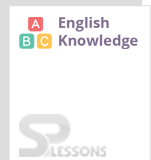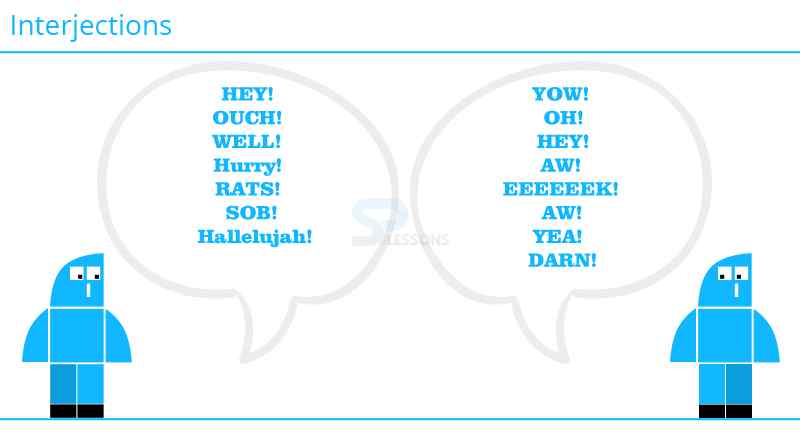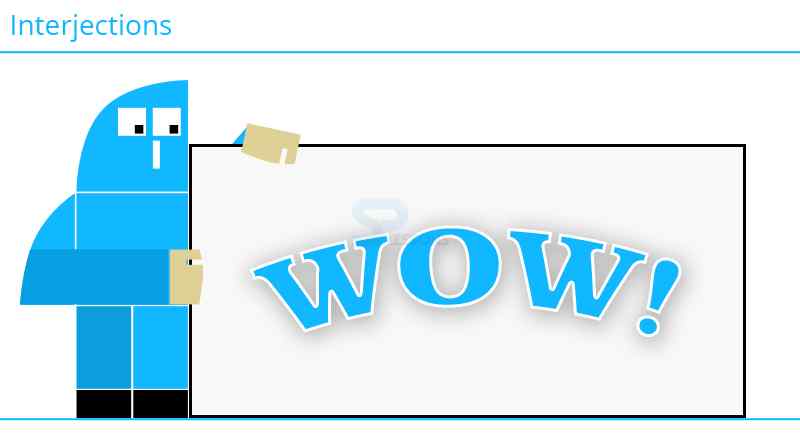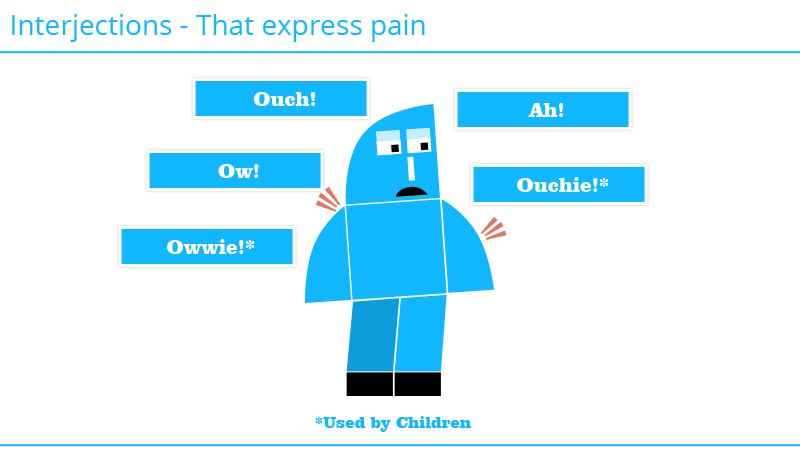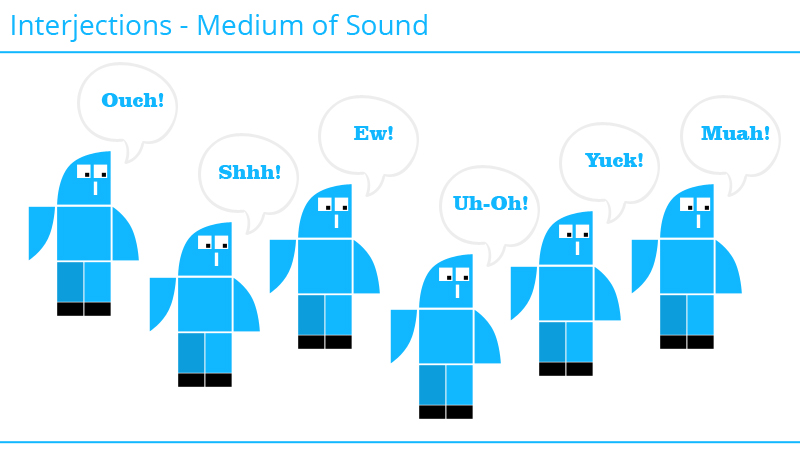 Introduction
Introduction
Words that express a feeling and a sudden expression of the people are called Interjections. It is a spontaneous feeling or an action. Interjections can be placed anywhere in the sentence. These words do not act as a noun, verb, and pronoun or as any other part of the speech.
Generally experts do not consider it as an important part o the speech because these words are not grammatically connected to any other part of the sentence. Interjection do not have any specific function to perform in the sentence. So even if these words are erased from the sentence, it would not make affect the sentence much and sentence would still hold its main meaning.
Interjections can stand alone as the sentence does not depend on interjections for giving the meaning of the sentence.
For example: alas, hey, hello, ouch, congrats, oh dear, oh well and oh my to name a few.
The image below shows more examples of interjections.
 Categories
Categories
The following table shows the various interjections and it various meanings when they are used in the sentence.
Interjections like any other part of speech are of different categories.
| Interjections | Meaning | Examples |
|---|---|---|
| Argh | This is used for expressing anger. | Argh! What have you done? |
| Aww | This is used for expressing affection. | Aww! Such a cute little puppy. |
| Duh | This is used for expressing something obvious. | This means she is my sister, duh! |
| Eek | This is used for expressing fear. | Eek! It is a mastermind game. |
| Gee/geez | This is used for expressing surprise. | Geez! You just took me by surprise. |
| Oops/whoops | This is used for acknowledging a mistake. | Whoops! I broke the scale. |
| Eww | This is used for expressing disgust | Eww! What a disgusting smell. |
| Whoa | This is used as a phrase of calming down. | Whoa! You need to relax a bit. |
| Shit | This is used for expressing a wrong doing or a mistake. | Shit! I forgot the keys to my home. |
1. Mild Interjections: Words which are punctuated with the help of a coma and are not differentiated from the sentence are called Mild Interjections.
For example:
- Oh, I wish it were your birthday today.
- Well, that is the wrong answer.
- Meh! Do you even care?
- Ah! That is a great view.
- Hmm, her house always smells like freshly made mint tea.
- Oh well, all’s well that ends well.
- Yuck! I hate this dirty smell coming from the ground.
- Wow! What a pretty tattoo.
- Hey! Stop troubling my sister.
- Eek! I just saw a cockroach which could fly.
- Oh! They are finally moving.
- Ouch! Did that hurt very badly?
- Yahoo! I received my first salary.
- I just put some salt in my brother’s sweet dish. Bazinga!
- Huh? Did you really just say that?
- What? You still have not completed your assignment?
- Oh really? I never thought he was such a pervert.
- What? When did I say that I will go with you?
- Oops! I’m sorry by mistake I broke the vase.
- Ohh! I didn’t know she was suffering through so much.
- Geeez! Do we need to do the project all over again?
- Hey! So glad you could make it to the party today.
- Hello! I am Harsh, your new class teacher.
- Yo! Can you pass me the ball?
- This was indeed, the picture that I was looking for.
- What a brilliant victory of Indian team.
- No, I have not eaten my food.
- Yippee! Our team has been selected for state finals.
- Hurray! We won the dance competition.
- Wow! Finally after five years we are the champions again.
- What! His sister expired yesterday?
- Ah! When did you reach here?
- Oh! What an adorable baby.
- Ouch! Your arm is hurting me.
- Alas! She is dead.
- Umm, can you get me his phone number?
- Hmm, I agree with what you are saying.
- Well, that wasn’t supposed to be like that.
- Nice! You completed the mission of the game in your first attempt itself.
- Good! Now we can start our journey with a bang.
- How sweet! Your little daughter made me this beautiful birthday card.
- Holly molly! I again forgot my car keys in the car only.
- Hello! Is anyone home?
- You finally crossed the level of the game, congratulations.
- Mr. Bhatt will teach us Mathematics. What an honor!
- Our new chemistry teacher is a teacher with whom I don’t get along. What a horror.
- Ugh! I am never studying history ever again.
- Whew! That was a really close call.
- Uh-oh! I think you guys are in some serious trouble after doing this.
- Phew! Finally I was able to finish my homework before the holidays got over.
- Mmmm, my compliments to the painter.
- Humph! I have known this since the last month.
 Uses
Uses
Uses of Interjection:
Generally, people think that interjections are words that can only be added in the starting of the sentence. But this is not completely true. Interjections are used t express emotions and so they can be included anywhere in the sentence, i.e. in the beginning, in the middle or in the end of the sentence.
While using in the interjection in the starting of the sentence.
Yikes, I did not realize there was a lizard under the bag!
Oh no, I cannot believe you still trust her with all your heart!
In the above examples, ‘yikes’ and ‘oh no’ are in the start of the sentence. In both the sentences, strong emotion is being expressed therefore the sentences are ending with an exclamation mark.
There are sentences in which interjections are used in the middle or the end of the sentence. Following are the examples.
It is raining again, huh?
In my point of view, my gosh, this is the most stupid thing you have ever done.
In the above examples, it is clearly shown that the interjections can be used in the middle or the end of the sentences too.
Identifying Interjections:
1. Yowza! You have the latest modification of the car.
In this sentence, ‘yowza’ is an interjection which is expressing a feeling of being impressed by the modification of the car.
2. Hurray! It is raining today.
‘Hurray’ is being expressed as a feeling of joy, so therefore it expresses the feeling of joy.
3. It is so beautiful my god I just can’t believe.
The phrase ‘my god’ is used in the sentence to show excitement.
4. Boo! We scared them.
‘Boo’ is a very obvious interjection that has been used in the sentence showing a feeling of getting scared.
5. Oh well! That was an amazing shot by the player.
Interjection used in the sentence is ‘oh well’.
6. Ohh! I can’t believe how graceful you look.
In the sentence, ‘ohh’ is used as a classic interjection which begins at the start o the sentence.
7. Ben was late for the lecture and yikes, the professor was angry.
In the sentence, yikes is an interjection which represents an emotion in the sentence.
8. Yay! Finally it is the weekend and we can relax and enjoy it.
‘Yay’ is an interjection used to express a feeling of joy.
9. Well gee! That is a very rude thing to say.
In this sentence, two interjections have been used i.e. well and gee.
10. Oops! I spilled the entire juice.
In this sentence, ‘oops’ is used to express a feeling of error.
Hope you had fun understanding the topic and enjoy it all the more while using it.


